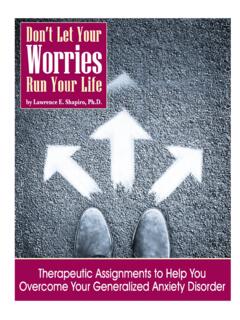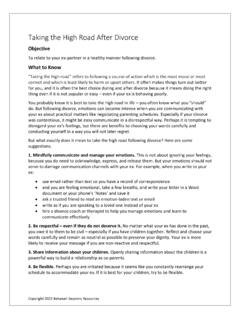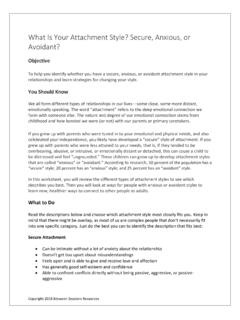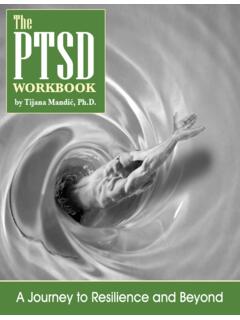Transcription of Binge Eating Workbook FINAL 123119
1 Overcoming Your Binge Ea1ng Disorder 40 Therapeu1c Ac1vi1es to Free You from the Guilt, Shame, and Self-Loathing of Binge Ea1ng Disorder Between Sessions Resources Norwalk, CT, USA. Overcoming Your Binge Ea1ng Disorder by Angela M. Doel, Cover and Interior Design by Mike Canavan 2020 Between Sessions Resources Permission is granted for the purchaser to copy these worksheets for personal or professional use, but not for resale. All other rights are reserved. Disclaimer: This book is intended to be used as an adjunct to psychotherapy.
2 If you are experiencing serious symptoms or problems in your life, seek the help of an experienced mental health professional. ISBN: 978-1-947009-07-3. Published by Between Sessions Resources 304 Main Avenue Suite 333. Norwalk, CT 06851. About the Author Angela M. Doel, , is a writer and director of opera1ons at Between Sessions Resources. She has served in various clinical supervisory posi1ons and worked as a family therapist. Ms. Doel earned her in Counseling Psychology at the University of Pennsylvania.
3 She holds an advanced cer1 cate in nutri1onal counseling, and her areas of specializa1on are health educa1on and ea1ng disorders. About the Series Overcoming Your Binge EaCng Disorder is part of a series of workbooks designed to give therapists and their clients easy access to prac1cal evidence-based psychotherapy tools. Each Workbook represents a complete treatment program. Dedicated to my children, with love - Aura, Amber, & Jus1n. My greatest teachers. Table of Contents Introduc1on ..ii Prac1cing Delay and Iden1fying Alterna1ve Ac1ons.
4 73. Sec4on 1. Self-Explora4on Developing Skills to Cope with Bingeing Do You Have Binge Ea1ng Disorder? ..1 and Overea1ng .. 76. What Triggers Your Binge Ea1ng? ..6 Elimina1ng Night Overea1ng ..79. Iden1fying the Messages You Received Iden1fying and Overcoming Obstacles About Food ..10 to Exercise ..82. Are You a Distracted Eater? ..14 Managing Your Emo1ons to Avoid Binge Ea1ng ..86. Is It Time to Give Up Chronic Die1ng? ..18. Coping with Shame and Guilt ..90. Iden1fying Faulty Beliefs That Support Unhealthy Ea1ng Habits.
5 21 Coping with Grief and Loss as You Recover ..93. How Does Stress A ect Your Ea1ng Habits? ..24 Mindful Self-Awareness Techniques to Decrease Bingeing Episodes ..96. Automa1c and Distorted Thinking ..28. Checking Behaviors and Over-concern Tracking Binges Through Self-Monitoring ..32. About Shape and Weight ..100. Learning to Eat When You Are Hungry ..35. Increasing Distress Tolerance During Are You Mo1vated to Stop Binge Ea1ng? ..38 Recovery ..103. Does Using Alcohol or Drugs Make Using a Contract to Commit to Change.
6 107. Your Ea1ng Problems Worse? ..41. Sec4on 2. Self-Monitoring Sec4on 4. Relapse Preven4on Prac1ce Establishing Healthy Controlling Your Urges ..111. Ea1ng Stopping a Binge Before It Starts ..114. Meal Planning to Eliminate Binge Ea1ng ..48 Iden1fying and Coping with Using a Food Log to Address Unhealthy Risky 117. Ea1ng Establishing an Accountability Plan in Mood and Symptoms Log ..56 Binge Ea1ng Disorder Recovery ..120. Accurately Iden1fying Your Body Cues ..59 Tracking Your Recovery Ac1vi1es.
7 123. Including Triggering Foods in Your Dealing with Self-Sabotage ..126. Healthy Ea1ng Plan ..62 Binge Ea1ng Disorder Relapse Ea1ng a Mindful Meal ..65 Preven1on ..131. Self-Care to Prevent Setbacks ..136. Sec4on 3. Techniques to Stop Binge Ea4ng Steps You Can Take to Improve Developing Problem-Solving Skills ..69 Your Health ..139. ^i Introduc1on Binge ea1ng disorder (BED) is the most common ea1ng disorder in adults. This disorder is characterized by uncontrolled excessive ea1ng, followed by feelings of embarrassment, disgust, shame, or guilt.
8 BED is di erent from bulimia nervosa, because people who Binge eat typically do not compensate for their binges through purging, intermigent calorie restric1on, or excessive exercise. People with Binge ea1ng disorder are usually overweight. They may feel like they have no control over their ea1ng and ohen eat in secret. They eat to excess even when they are not hungry. Some of the signs of Binge ea1ng disorder include: Consuming unusually large amounts of food in a dis1nct period of 1me within a 2-hour 1me frame.
9 Reoccurring episodes at least once per week for at least three months. Ea1ng rapidly and uncontrollably. Ea1ng even when not physically hungry. Ea1ng around other people, or in public, is uncomfortable or avoided altogether. Hiding food or food containers and wrappers in strange places. Hoarding, stockpiling, or stealing food. Crea1ng a lifestyle or rituals in order to schedule Binge sessions. Ea1ng in secret. Ea1ng when overwhelmed, upset, or stressed to cope with distressing feelings. Overea1ng when alone; ea1ng normally when around other people.
10 Ea1ng con1nuously throughout the day, with no planned meal1mes. Inability to control how much food is consumed. Experimen1ng with fad diets or repeatedly star1ng and stopping diets. Experiencing unwanted weight gain that may lead to obesity. Frequent co-occurring mental health issues, such as substance abuse, depression, or anxiety. Binge ea1ng disorder impacts people of all ages, cultures, and walks of life. Currently more than 7 million Americans struggle with Binge ea1ng disorder. Not surprisingly, there are medical problems associated with this disorder, including high blood pressure, type II diabetes, irregular menstrual cycles, skin condi1ons, and heart disease.






